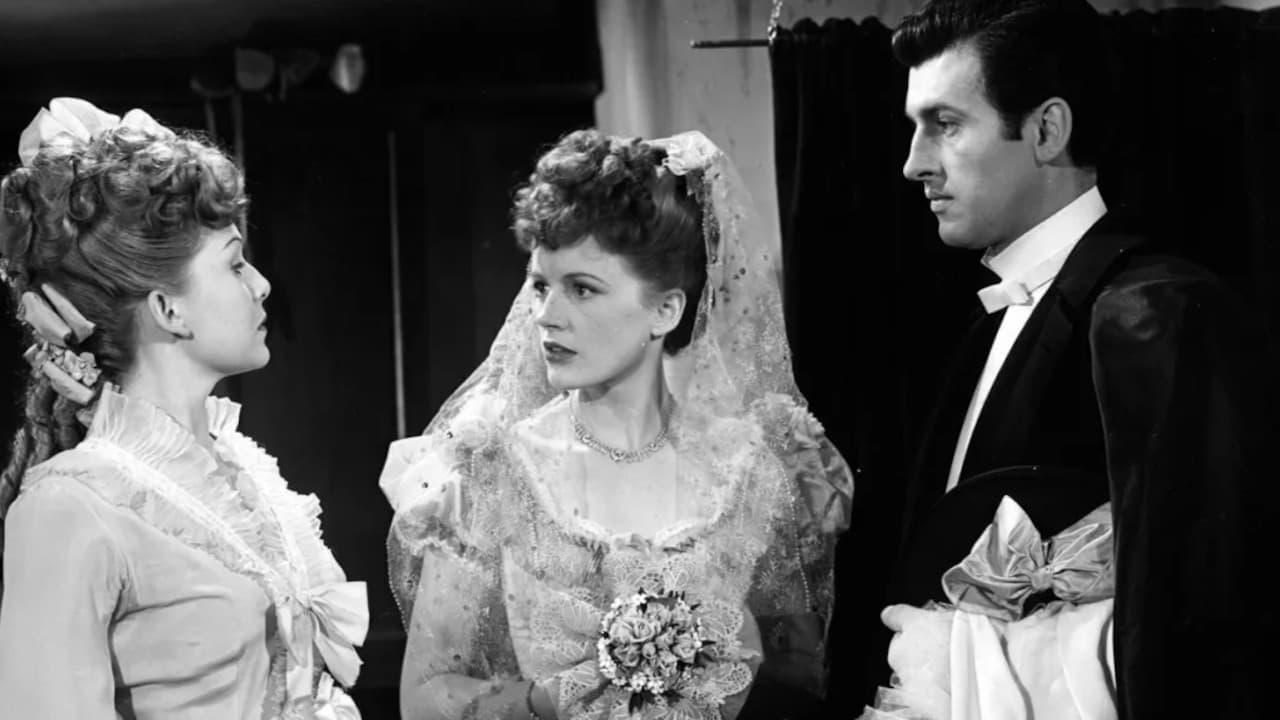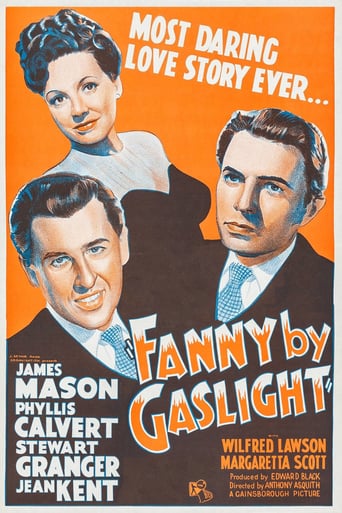

Highly Overrated But Still Good
... View MoreFantastic!
... View MoreThis is a small, humorous movie in some ways, but it has a huge heart. What a nice experience.
... View MoreJust intense enough to provide a much-needed diversion, just lightweight enough to make you forget about it soon after it’s over. It’s not exactly “good,” per se, but it does what it sets out to do in terms of putting us on edge, which makes it … successful?
... View MoreAnn Stephens (Fanny) is sent to boarding school and returns home as Phyllis Calvert (Fanny) to look after her family. However, things take a turn when her true identity is revealed. According to the morals of the day, this becomes a burden to her which she must either accept and toe the line or rebel against. Both options lead to unhappiness. Or do they? The story is saved by philandering gentleman James Mason (Lord Manderstoke) who makes his entrance in the film with a wonderful delivery of the line "Get out of my way". Unfortunately, we don't get enough of Mason. Other cast members are good but Calvert and rising political star Stewart Granger (Harry) are pretty lucklustre with other characters outshining them. There are some good scenes and the film builds towards an inevitable showdown between Mason and Granger but it never really breaks into stride. It's a bit boring and has an unsatisfying predictability.
... View MoreFanny By Gaslight was one of Gainsborough Pictures romances starring its greatest stars, Phyllis Calvert, Stewart Granger, and James Mason all in their salad days. It's a Victorian soap opera with a lot of Dickens like class consciousness thrown into the mix.The best works of Charles Dickens like David Copperfield, Nicholas Nickleby, and Great Expectations have the common thread of a young man of limited means making his way in the world who with a combination of hard work and good circumstances comes out on top at the end of the story. Fanny By Gaslight is just that kind of a story, except that Dickens would never have his protagonist be a woman. But Fanny Hooper as played by Phyllis Calvert is as good a Dickens hero as you will ever find.When Calvert returns from boarding school her father, John Laurie, is killed in a fight ejecting a drunken James Mason from his establishment which is just this side of a brothel. When he dies she finds out that Laurie was not her real father, that she is the daughter of a prominent politician Stuart Lindsell. She's taken into his house as a maid. Calvert also makes the acquaintance of rising young politician Stewart Granger who is a protégé of Lindsell and Granger falls big time for Calvert.Eventually all this becomes known about Calvert's background and it leads to an inevitable climax between Mason and Granger. How it gets to that point is the crux of the film.Several incidents from the 19th century are used. The sex scandals are pieced from those involving Charles Dilke and Charles Parnell. Lindsell's suicide, jumping in front of a train is a recreation of the death of William Huskisson killed accidentally though by George Stephenson's newly invented locomotive.Calvert and Granger are a winning pair of lovers and James Mason is one hateful aristocratic villain, a privileged man who lives to enjoy his privileges at the expense of others as Phillip Barry said. I was surprised at how well Fanny By Gaslight holds up today. In fact the Hays Office had it banned from the USA for a while. Maybe that's its secret.
... View MoreFanny by Gaslight is an inspirational film, in that it is willing to take risks with the subject matter which not only questions British morals, but exposes its hypocrisy regarding them! James Mason illustrates the depth of his talent, and makes the film all the more worth watching.Fanny being the epitome of Victorian double standards illustrates to us why the feminist movement came into being. Her oppression eventually produces a rebellious woman in that she agrees to marry Harry just to be defiant, rather than to conform to the man-made idea of marriage. Therefore, Fanny's decision to marry Harry is not meant to produce a cliché happy ending. In this respect the producers of this controversial film are taking more risks. It is that they are willing to take risks with this film that the producers need recognition. It is about time contemporary film producers, directors etc. were willing to do the same instead of playing it safe, culminating in producing very bland films which are an insult to the art. By doing this, the only risks contemporary film makers are taking is that of loosing audiences.. This void will be filled by French film producers etc. who have already spotted the gap in the art of film making, and are filling it fast!
... View MorePoorly paced, but highly entertaining, and quite thought-provoking melodrama. It is typical Gainsborough fare: shrouded Victorian settings; innocent, swooning heroines, who have the most godawful horrors thrown at them in an unenviably short stretch of time; 'dashing' (i.e. stilted) heroes; arousingly sadistic villains played by James Mason; the intrusion of music hall cheek into an already vulgarised 'gentility'; good-hearted Cockney servants, here called Chunks; a brazenly frank, unheard of in contemporary Hollywood, treatment of sexuality.In many ways, FANNY comes straight out of Victorian melodrama. The hypocrisy of Victorian England as essayed in Dickens and Conan Doyle is rife here: the delicate pattern of respectability is shown to be infinitely fragile. This is why the accumulation of Fanny's traumas is so plausible - one toppling domino of the edifice of respectability leads to a complete and far-reaching collapse.The result is a failure of patriarchy, an oppression split against itself. Look at the frightening scene where Fanny's 'real' father is shown in splintered mirror reflection - the pressure turns him, Jekyll-and-Hyde-like, from a feckless, passive fraud, into a figure from a horror film, as he foresees his own death, the only option to his self-created web of deceit (wow, you really do get into it!). Fanny's first family home stands over her supposed father's burlesque house, home to many of the Victorian great and good. The fact that she has two fathers emphasises this pervasive dichotomy.Women, in this double world, have only two options open to them, and they have a rotten deal in both. If they try to live with integrity and decency, like Fanny, they are buffeted, nay fairly walloped by a most malevolent Fate (or the workings of a corrupt social machination, whatever you want to call it). Fanny's swoonings are less conventional Victoriana than blows dealt by forces beyond her.If, on the other hand, women transgress, like Lucy, or her father's wife (both, appropriately, if cheerfully xenophobically, linked to Frenchness), they are equally vulnerable to caprice, as their lovers turn against them, or abandon them. The film is also very good on how the idea of 'woman' is constructed in patriarchal society - there are many elaborate scenes of dressing and undressing, distortions of 'natural' femininity. Class construction is analysed too, also limiting and defeating men. The title of the film might seem oblique, or merely atmospheric, until we note all the gaslamps standing suggestively between characters; part of a wider phallic plot, seen most interestingly, less obviously, between Stewart Granger and James Mason. Mason is perversely the most sympathetic character in the film. I say perversely, because, for the first hour and a half, he is a real monster, a glorious, diabolical, handsome, unredeemably vicious, incredibly sexy monster, who clearly has the filthiest, and most elaborate, Sadean sex ever. He is the ultimate transgressor, taboo in both the Underworld and respectable society, the two being complicit in the same corrupting system. He is only on screen in annoyingly , if appropriately brief, spurts - the first fifteen minutes of the film is electrifying entertainment. He is an aristocrat, locus of all the fears, yet desires (and 1940s British women worshipped him) of the British middle classes.But when he goes to France - as all four protagonists do: it is a site of freedom from the ubiquitous repression of Britain, but also the ultimate venue of closure where everything is fatally brought to a head - he becomes a much more understandable, tragic figure. We see he has been demonised by respectable society as a demonic Id that must be cast out. His reduction from malevolent swaggerer to simian depressive is a shock to behold. His forcing of the duel is less a matter of honour than a poignant wishing for death. Mason is outstanding, turning a potential caricature into a figure of far greater depth. He is the Fassbinder hero of this melodrama, the tormented transgressor; not the two protagonists, whose desire for conventionality will only replicate the system that tortured them in the first place.What is finally remarkable about the film is how these issues managed to get aired at the height of World War II. Gainsborough films were by far the most popular among British audiences at a time when duty, austerity, self-denial was mandatory. These films, and especially FANNY, by contrast, became the focus of all those repressed desires - a dissatiafaciton with authority and patriarchy; the thrill of (particularly female) transgression; the impulse to excess; a rejection of duty and tradition; all the things in real life audience members were supposed to be defending. Is it any surprise Labour got in the following year? That is why the films, beyond their stereotypical melodrama, remain enduringly fascinating. Just more James Mason, please...mmm.
... View More